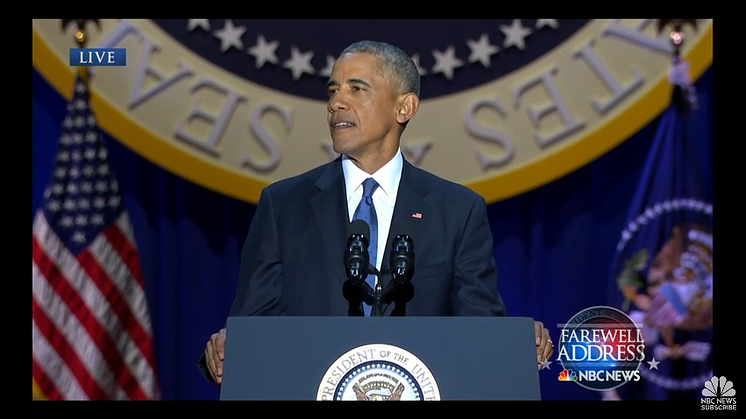
Blog post -
Quick reaction to Obama's farewell speech: Post-fact and fake news a "threat to democracy"
Barack Obama's farewell speech lasted almost an hour, but for those of us passionate about the media business this passage at around the 23-minute mark (link below) was of particular interest.
He labeled fake news and post-fact reporting a threat to democracy:
"For too many of us, it’s become safer to retreat into our own bubbles, whether in our neighborhoods or on college campuses, or places of worship, or especially our social media feeds, surrounded by people who look like us and share the same political outlook and never challenge our assumptions.
"And the rise of naked partisanship and increasing economic and regional stratification; the splitting of our media into a channel for every taste; all this makes this great sorting seem natural, even inevitable.
"And increasingly, we become so secure in our bubbles that we start accepting only information – whether it’s true or not – that fits our opinions, instead of basing our opinions on the evidence that is out there. And this trend represents a third threat to our democracy.
"Politics is a battle of ideas. That’s how our democracy was designed. In the course of a healthy debate we prioritize different goals and different means of reaching them. But without some common baseline of facts, without a willingness to admit new information, and concede that your opponent might be making a fair point, and that science and reason matter, then we’re going to keep talking past each other. And will make common ground and compromise impossible."
My take-aways from this passage were:
- More choice = less informed debate. There is a huge range of voices and opinions to choose from. But consumers aren't choosing them. Instead, niche channels are feeding the echo chambers. Ironically, back when we had only a handful of TV channels and newspapers to choose from, we were necessarily exposed to a wider range of views. How can we reverse the trend? Force consumers to consume news from a variety of channels (unrealistic)? Force channels to be more balanced (even less realistic)?
- More back-to-basics reporting. Editorializing has become common, and there is certainly value in by journalists adding insights and context. But too often, opinions are taken at face value and treated as fact. We need a return to "science and reason" (in Obama's words, which prompted some applause).
- More research, more depth. Journalists need serious, trustworthy sources if they are to swim against the post-fact tide with serious reporting. The heightened awareness of, and backlash to, post-fact reporting therefore calls for more earnest, research-based commentary. Strong, fact-based messaging has always been in demand. For example, results of surveys and proprietary R&D have always been a good news hook. But now is the time to dispense with glib corporate messaging and (re)build audience trust through substantive commentary.
All of this leads back to my point a few weeks ago, that news consumers must take more responsibility for their own media consumption.
As Obama implored his audience around 40 minutes into his speech, "if you’re tired of arguing with strangers on the internet, try talking with one of them in real life".
